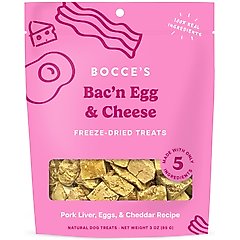Can Dogs Eat Eggs?

Photo by Chewy
For pet parents who love their eggs, the question becomes inevitable: Can dogs eat eggs too?
They sure can! While they shouldn’t be having any of your brunchtime benny (keep all that Hollandaise sauce for yourself), plain eggs, in moderation, are good for dogs—and yummy too.
We spoke with veterinarians and a pet nutritionist to give you the full story on whether dogs can have eggs, including the nutritional benefits and how to introduce them to your dog’s diet.
Before introducing any new food into your dog’s diet, always check with your veterinarian.
Key Takeaways
- Dogs can eat fully cooked, plain eggs—such as boiled or scrambled—as a protein-rich treat in moderation.
- Eggs are packed with nutrients, including digestible protein, fatty acids, vitamins, and minerals that support your dog’s skin, coat, and muscle health.
- Aways cook eggs thoroughly and skip seasonings. Avoid feeding dogs raw eggs, which pose a risk of biotin deficiency and foodborne illness.
- Limit treats like eggs to no more than 10% of your dog’s daily diet.
Can Dogs Have Eggs?
Yes, dogs can have eggs, as long as they’re fully cooked and unseasoned.
Scrambled eggs and boiled eggs are both great choices, because they’re cooked all the way through and easy for your dog to eat.
Are Eggs Good for Dogs?
Eggs are just as nutritious for your furry friend as they are for you.
Animal health scientist Kathy Gross, MS, PhD, PAS, Dipl. ACAN says eggs are a good source of the following nutrients:
- Highly digestible protein, which helps dogs build muscle, according to Albert Ahn, DVM, head veterinarian at Wayne Valley Animal Hospital in Wayne, New Jersey
- Fatty acids, like omega-3s and monounsaturated fats, which help improve the appearance of your dog’s skin and coat
- Vitamins and minerals, including vitamin A, which promotes healthy vision and supports the immune system
Are Eggs Bad for Dogs?
While eggs can be beneficial for your dog, they do come with some drawbacks. Here are the potential risks of eggs for dogs:
- Hyperlipidemia: Eggs are relatively high in fat and cholesterol compared to other types of protein. Because of this, they can contribute to hyperlipidemia (elevated level of fats in the blood) if your dog eats too many or has an underlying health condition that makes them susceptible to hyperlipidemia.
- Digestive upset: Any new food can also cause digestive upset if your dog isn’t used to it or you give too much too soon.
- Biotin deficiency: Raw egg whites are high in a specific type of protein called avidin. Avidin binds to biotin (a type of B vitamin that supports the health of your dog’s skin, digestion, metabolism, and cells), preventing proper absorption. This can lead to a biotin deficiency over time, but thoroughly cooking eggs neutralizes biotin and eliminates this risk. Also, egg yolks are a good source of biotin, so feeding whole eggs rather than just whites is helpful.
- Allergies: Some dogs may have food allergies or sensitivities to eggs, says Jerry Klein, DVM, chief veterinary officer for the American Kennel Club. So, if you’ve never given eggs to your dog, start with a small amount and watch for symptoms. If you notice any, like vomiting or diarrhea, contact your vet or an emergency clinic right away.
How Much Egg Can My Dog Eat?
Eggs are a treat and, like all treats, you should only feed them to your dog in moderation. All treats combined should make up no more than 10% of your dog’s diet, with the rest coming from a complete and balanced diet.
That said, here’s the recommended serving size for dogs based on their size:
| Dog Size | Serving Size | Frequency |
|---|---|---|
| Extra-small dogs (2–10 pounds) | 1/4 large egg | 2–3 times per week |
| Small dogs (11–20 pounds) | 1/2 large egg | 2–3 times per week |
| Medium dogs (21–50 pounds) | 1 large egg | 2–3 times per week |
| Large dogs (51–90 pounds) | 1 large egg | 2–3 times per week |
| Extra-large dogs (91+ pounds) | 2 eggs | 2–3 times per week |
How To Safely Feed Eggs to Dogs
In addition to serving size, safety is another important consideration when giving your dog eggs. Pet parents should adhere to the following guidelines:
- Talk to your vet. If your dog has never eaten egg before, get approval from your veterinarian before giving it to them.
- Start slowly. Once you have the green light from your vet, start incorporating eggs into your dog’s diet slowly. Dr. Klein recommends starting with once per week to ensure your dog doesn’t have any gastrointestinal issues (read: vomiting or diarrhea) afterward.
- Cook thoroughly. Be sure to cook the eggs first to make sure there are no harmful pathogens like Salmonella. “Feeding raw eggs to dogs has the same risks as people eating raw eggs,” says Dr. Klein. But cooking eggs reduces that risk. Cooking the eggs also reduces the risk of biotin deficiency.
- Keep them plain. You should cook eggs without any oil, butter, salt, seasonings, or other additives, adds Dr. Klein.
With these guidelines in mind, here are a few fun ways to feed your dog eggs, courtesy of Dr. Ahn:
- Crumble some hard-boiled egg directly onto your dog’s food.
- Make scrambled eggs and serve them as part of your dog’s meal.
- Boil an egg, slice it into rings, and feed a few rings to your dog as a snack.
- Make an omelet with spinach, diced tomatoes, and lean turkey breast. (A favorite of Dr. Ahn’s Golden Retriever, Fenton!)
Recommended Products
Homemade Dog Treats With Egg
You can also incorporate eggs into homemade dog treats. The following are dog-approved recipes:
Store-Bought Dogs Treats With Egg
Some store-bought dog treats also include egg as a main ingredient. Some favorites include:
Recommended Products
My Dog Ate Too Much Egg—What Do I Do?
If your dog eats too many eggs, you may notice signs of stomach upset, like:
- Diarrhea
- Vomiting
- Poor appetite
- Abdominal discomfort
- Excess gas
Typically, this isn’t an emergency, and your dog will just need some time for their stomach to settle. However, the high fat content of eggs can put dogs at increased risk of pancreatitis.
So, if diarrhea or vomiting are excessive or you’re concerned about your dog’s health in any way, contact your vet for advice on what to do next.
FAQs About Eggs for Dogs
Can puppies eat eggs?
Yes, puppies can eat eggs, but be mindful of their portions. They should only eat about 1/4–1/2 an egg two to three times a week, depending on their size.
Can dogs eat boiled eggs?
Yes, a small amount of hard-boiled eggs is a great treat for dogs. Just ensure they’re fully cooked to reduce health risks.
Can dogs eat scrambled eggs?
Yes! As Dr. Ahn suggested, scrambled eggs are a great way to feed your pup eggs, but remember that all treats, including eggs, should make up no more than 10% of your dog’s daily caloric intake.
Can dogs have raw eggs?
No, dogs shouldn’t eat raw eggs. Eggs should be fully cooked to reduce the risk of food poisoning and biotin deficiency.








